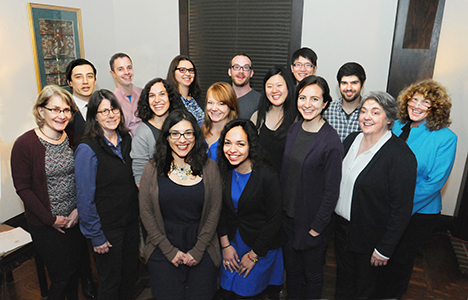TEA Recipients 2015-2016 to 2019-2020
2019–2020
2018–2019
2017–2018
2016–2017
2015–2016
2019–2020 Recipients
Jeremy Adams, Chemical and Biomolecular Engineering, Mapping the Math: Using Concept Maps to Learn Controls Theory
Jakob Dahl, Chemistry, Promoting Understanding from Experiments by Visualizing Results in an Introductory Organic Chemistry Lab
Natalia Duong, Theater, Dance, and Performance Studies, Normalizing Access and Accommodation in Classrooms **Author has requested essay not to be published
Casey Finnerty, Civil & Environmental Engineering, Teaching Students to Think Creatively about Problems, not just Answer Them
Jade Fostvedt, Chemistry, The Student Becomes the Master: Student-Led Problem Solving in “Flipped” Office Hours
Holly Gildea, Helen Wills Neuroscience Institute, Reframing Failure: Teaching Iterative Troubleshooting over Results in Laboratory Science
Natalie Graham, Environmental Science, Policy and Management, Putting Global Patterns in Perspective with Experiential Interdisciplinary Learning
Samuel Kieke, Sociology, Social Theory as Puzzle: Piecing Together Conceptual Definitions
Haefa Mansour, Chemical and Biomolecular Engineering, Revolutionizing Classroom Problem-Solving to Mimic the Real World
Maryam Moeini Meybodi, Graduate School of Education, Task-Based Language Games: A Solution to Incorporation of Culture in Grammar Lessons
Seiya Ono, Electrical Engineering and Computer Sciences, Lowering the Entry Barrier to Build Inclusive Lab Spaces
Kate Pennington, Agricultural and Resource Economics, Inviting Students In: Improving Diversity by Increasing Participation
Andrew Shi, Mathematics, Conquering the Top 10 Algorithms of the 20th Century
Jonas Teupert, German, Collaborative Learning in Times of Remote Instruction
Carly Trachtman, Agricultural and Resource Economics, Understanding Social Welfare Comparisons without Math Anxiety
2018–2019 Recipients
Nicholas Anderman, Geography, Contextualizing Social Theory with Collaborative Timelines
Anamika Chowdhury, Chemical and Biomolecular Engineering, Learning Why and not just How
Ravit Dotan, Philosophy, How to Increase Participation in Section
Nicholaus Gutierrez, Rhetoric, Online Research in the Age of Google
Audrey Haynes, Integrative Biology, The Power of Personalized Interventions
Victor Reyes-Umana, Plant and Microbial Biology, Developing Narratives for Aspiring Biologists
2017–2018 Recipients
Varsha Desai, Chemistry, Why Am I Doing What I Am Doing?
Rosalind Diaz, English, Collaborative Grading Rubrics for Assessing Student Writing
Julia Lewandoski, History, The Thesis Statement as The Key to Unlock Essay Writing
Jonathan Schellenberg, Economics, Making it Matter: Connecting Theory to Reality in Economics
2016–2017 Recipients
Vanessa Brutsche, French, Beyond Plot: Discussing the Stakes of Literary Texts
Carli Cutchin, Comparative Literature, The Interpretive Problem: A Key Concept in Teaching Writing
Martin Eiermann, Sociology, Social Theory as a Map to the World
Clare Ibarra, History, Bridging the Gap between K-12 and University-level History
Jeffrey Kaplan, Philosophy, Reading Quizzes: a Mild Technological Innovation
Nicholas Kern, Astronomy, Boosting Class Engagement with Software-Driven Section Worksheets
Evan Klavon, English, Experimental Method: A Guided Lesson for Synthesizing Science and Literature
Linda Louie, French, Revision without Tears: In-Class Writing with the Pomodoro Technique
Brittany Meché, Geography, Teaching the Politics of Representation in Development Studies
Samuel Nicholas Ramsey, Group in Logic, Permission to be Confused
2015–2016 Recipients
Riva Bruenn, Plant and Microbial Biology, Plant Morphology is Just a Game
Eduardo Escobar, Near Eastern Studies, Live Digital Translation for Dead Languages
Christian Lambert, Public Policy, Deploying General Rubrics to Preclude the Pitfalls of Grading
Yi-Chuan Lu, Physics, Improving Board Work with Colors
Mercedes Taylor, Chemistry, Overcoming Emotional Reactions to Chemical Reactions


